- Queer Word
- Posts
- 📚️ the queer words that defined the last 10 years 📚️
📚️ the queer words that defined the last 10 years 📚️
an odd mish-mash of fabulous nonsense, visibility, and backlash
QUEER WORD
Queer Words, Straight Dictionaries: Tracking Our Visibility Through Language
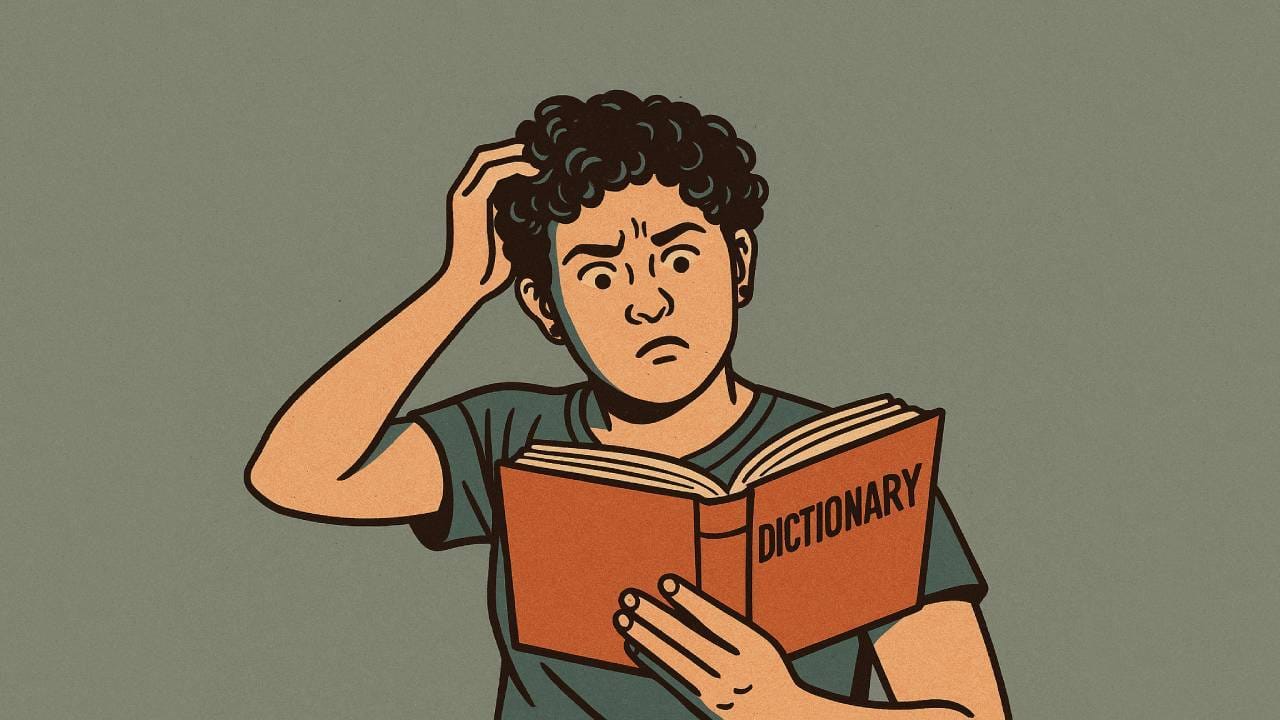
So I trawled through a bunch of ‘Word of the Year’ lists - American Dialect Society, Collins, Oxford, Macquarie, dictionary.com, Merriam Webster - to see what words were highlighted over the last decade. Some are gloriously queer, some are barely queer-adjacent, but line them up and you get an accidental queer history lesson, told in short, sharp dictionary entries. Let’s take a look….
2015
They (American Dialect Society)
What it means: Singular they, used as a gender-neutral pronoun.
Let’s use it in a sentence: Pat said they liked my haircut. They lied.
Why it was chosen: You’re probably baffled that this word was only acknowledged so recently. It seems as though we’ve been using it forever, but it finally broke through to the mainstream (or, you know, the straight world) in the 2010s. And, sure, linguists will tell you it’s nothing new (Shakespeare was using the singular they centuries ago), but the bigger cultural conversation about gender suddenly made it feel urgent.
Transgender (Collins English Dictionary)
What it means: Relating to people whose gender identity differs from the sex they were assigned at birth.
Let’s use it in a sentence: 2015 was the year ‘transgender’ went mainstream. Unfortunately, so did transphobia.
Why it was chosen: Again, kind of strange this word wasn’t highlighted until 2015. But, then again, it was a big year for visibility - Caitlyn Jenner came out and Laverne Cox graced the cover of Time magazine with the headline ‘The Transgender Tipping Point’. And the mid-2010s did feel like a tipping point for trans representation in media.
The kicker, though, is that Increased visibility went hand-in-hand with backlash. And, sadly, we’re still wading through it.
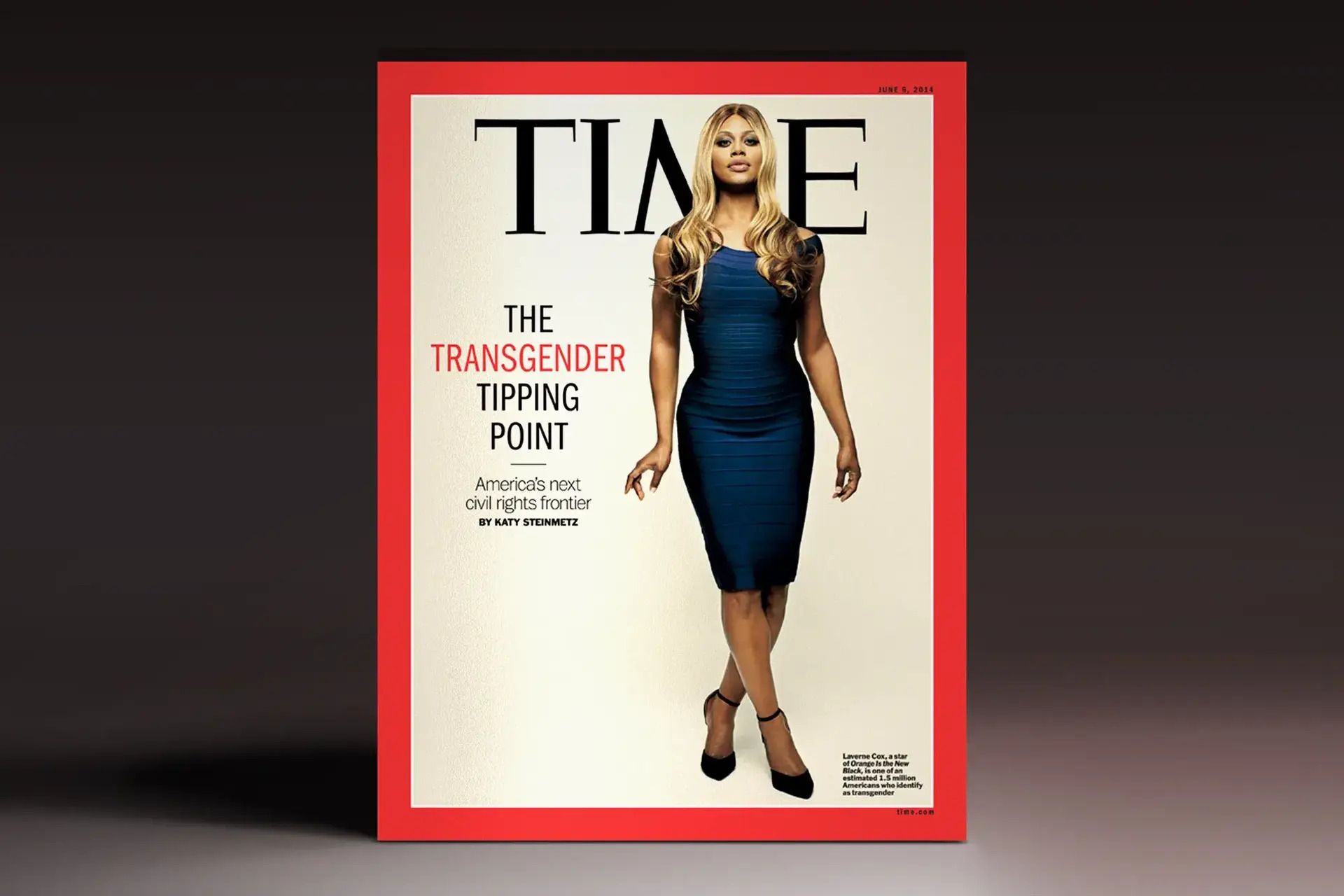
Laverne Cox on the cover of Time
2016
Throw Shade (Collins English Dictionary)
What it means: To make a subtle, cutting remark.
In a sentence: Miranda threw shade at my sunburnt complexion. Alas, it was the only shade I’d seen all day.
Why it was chosen: A phrase rooted in Black queer ballroom culture, the term found a much larger audience thanks to the contestants who regurgitated it on reality TV behemoth RuPaul’s Drag Race.
Post-truth (Oxford)
Not queer, but crucial context: 2016 was also the year of Brexit and Trump (Ugh!). Truth was suddenly optional, and queer people were about to get caught in a culture war centred around ‘my beliefs’ and ‘alternative facts.’
2017
Gender-fluid (Collins)
What it means: Not fixed in one gender identity.
Let’s use it in a sentence: We were all fed up of Martin making crude jokes about his gender fluid.
Why it was chosen: The mainstream was catching on to what many had always known: gender isn’t a binary
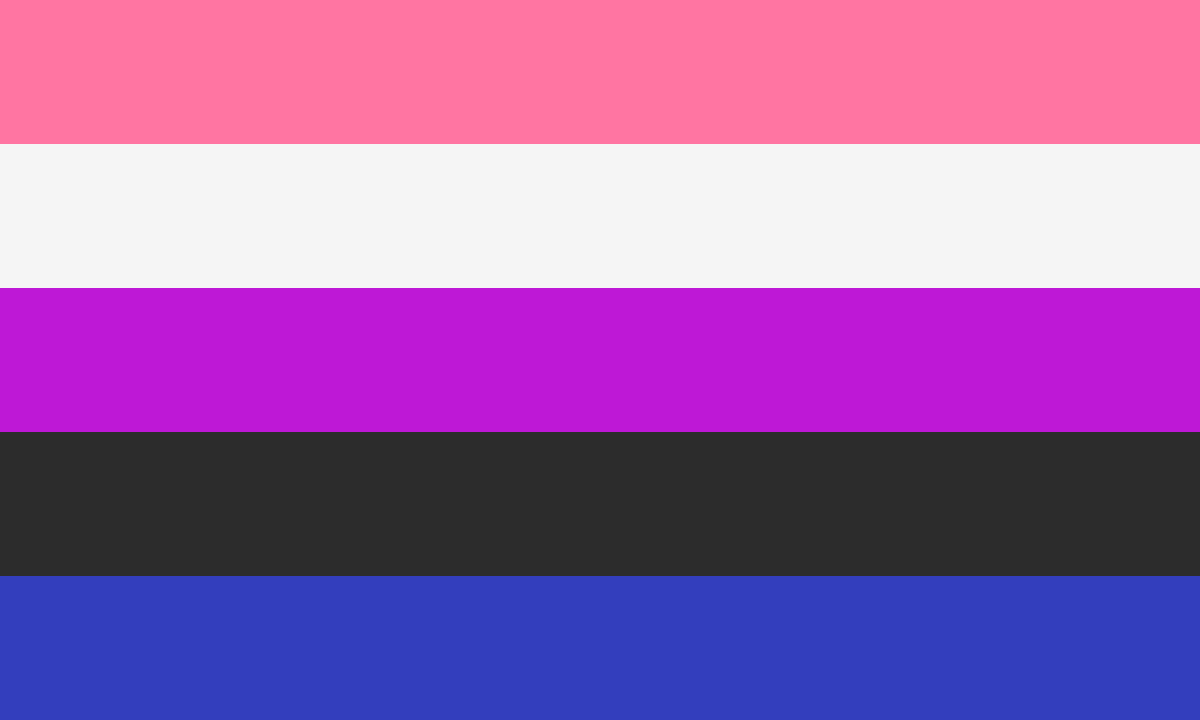
the gender-fluid flag
Echo Chamber (Collins)
Again, not explicitly a queer word, but darkly relevant. Around 2017, we all realised that while queer people were finding supportive communities online to process our identities and experiences, bigots were doing exactly the same (only they were feeding each other junk science and hatred instead of positive affirmations).
2019
Pronouns (American Dialect Society)
What it means: The words we use to refer to someone without using their name, often revealing how they see their own gender.
Let’s use it in a sentence: Introducing yourself with pronouns is easy — unlike explaining for the hundredth time why it matters.
Why it was chosen: Pronouns became the front line of queer visibility. Email signatures, conference name badges, Instagram bios - suddenly it felt as though they weren’t optional extras. It was both a big sign of progress and an unexpected new battleground.
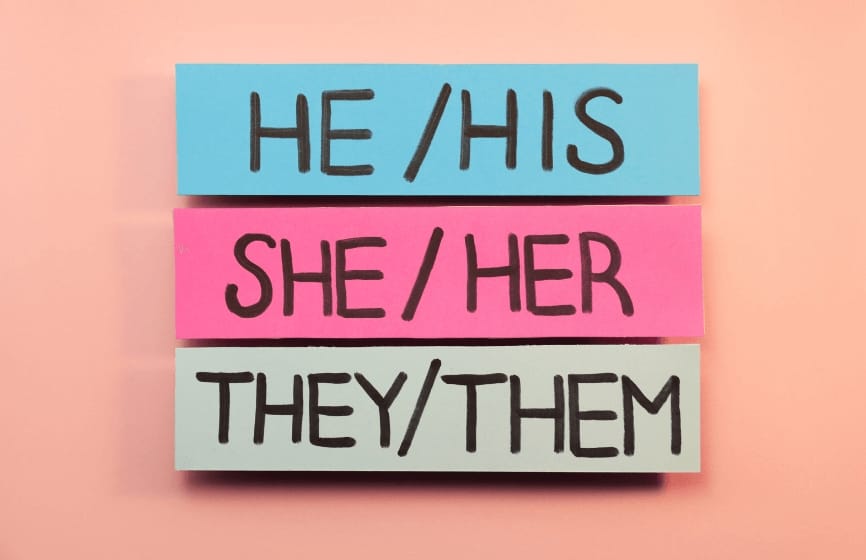
Cancel culture (Macquarie)
Not exactly a queer term, but queer and trans people (and, more broadly, women) were often painted as the villains here - the dreaded ‘cancellers’ - for the crime of pointing out harm. It also hinted at where we were headed - a culture allergic to accountability.
2021
Yassify (American Dialect Society)
What it means: To make glamorous, fabulous, and extra, often via absurd AI filters.
Let’s use it in a sentence: I yassified my cat. He’s now a drag queen called Whiskers McNibbles.
Why it was chosen: A frivolous camp online trend went properly viral. Everyone was equally fascinated and horrified by what these new filters could achieve (and it was also the perfect mindless distraction for those stuck indoors over lockdown).

a yassified Mrs. Doubtfire
Neopronoun (Collins)
What it means: Newly coined pronouns like xe/xem or ze/zir.
Let’s use it in a sentence: When Marcel introduced their neopronouns, half the group nodded in support, while the other half quietly got their phone out to Google it under the table
Why it was chosen: As pronoun awareness expanded, so did the language itself. Of course, it triggered the predictable right-wing frothing, but it also showed how creative and adaptable language can be when people are given the room to name themselves.
Allyship (dictionary.com)
What it means: The practice of being an active supporter of marginalised groups.
Let’s use it in a sentence: Putting a rainbow on your logo in June is not allyship.
Why it was chosen: Following George Floyd's murder and increased BLM visibility, people started questioning what genuine solidarity looked like (though, as it turns out, many wanted to call themselves an ally without having to actually do anything that made them uncomfortable in the slightest).
2022
-ussy (American Dialect Society)
What it means: A suffix from ‘pussy,’ applied playfully in all manner of ways (though, let’s be honest, mostly sexual): bussy (boy pussy), thrussy (throat pussy), etc.
Let’s use it in a sentence: My bussy is ready. My thrussy is ready. And, I might not know what it is, but my damn quadrussy is ready!
Why it was chosen: Linguistic play at its queer, chaotic finest. An inside joke that somehow captured the imaginations of the more chronically online end of the internet, -ussy showed how quickly queer slang can mutate, multiply, and make its way into the mainstream.
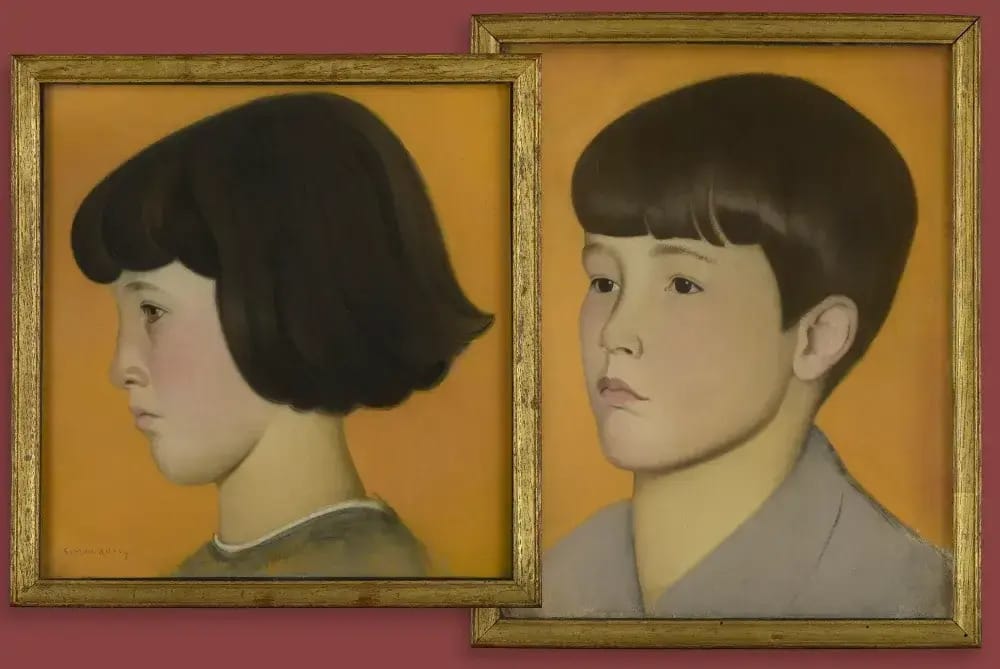
Paintings from French artist Simon Bussy. Perhaps it’s for the best that he didn’t live long enough to discover what his name now means…
It’s giving (American Dialect Society)
What it means: A phrase meaning ‘this evokes…’ usually followed by something hyperbolic.
Let’s use it in a sentence: This haircut - it’s giving recently divorced middle-aged dad who also DJs at a pop-up dandelion wine bar frequented by university students.
Why it was chosen: Born from Black queer vernacular, popularised via TikTok, and fully mainstreamed by beauty influencers. Yet another reminder (as if you needed one) that queer slang is the backbone of internet culture.
Vibe shift (Collins)
What it means: A sudden change in mood, culture, or style.
Let’s use it in a sentence: You could feel the vibe shift the second Bart mentioned their crypto portfolio.
Why it was chosen: The early 2020s were nothing but vibe shifts — pandemic to protest, lockdown to ‘back to normal.’ Only, we never got back to normal. The world’s vibe was well and truly off.
2024
Demure (dictionary.com)
What it means: Traditionally the word means ‘modest, reserved’; but in 2024 it was reimagined online by queer TikTok-er Jools Lebron as ironic camp.
Let’s use it in a sentence: I turned up in a mesh crop top and six-inch heels and when anyone raised an eyebrow, I just smiled sweetly and said, ‘Demure.’
Why it was chosen: A glorious example of queer reappropriation: flipping a prudish, pearl-clutching word into a badge of nonsensical self-mockery.
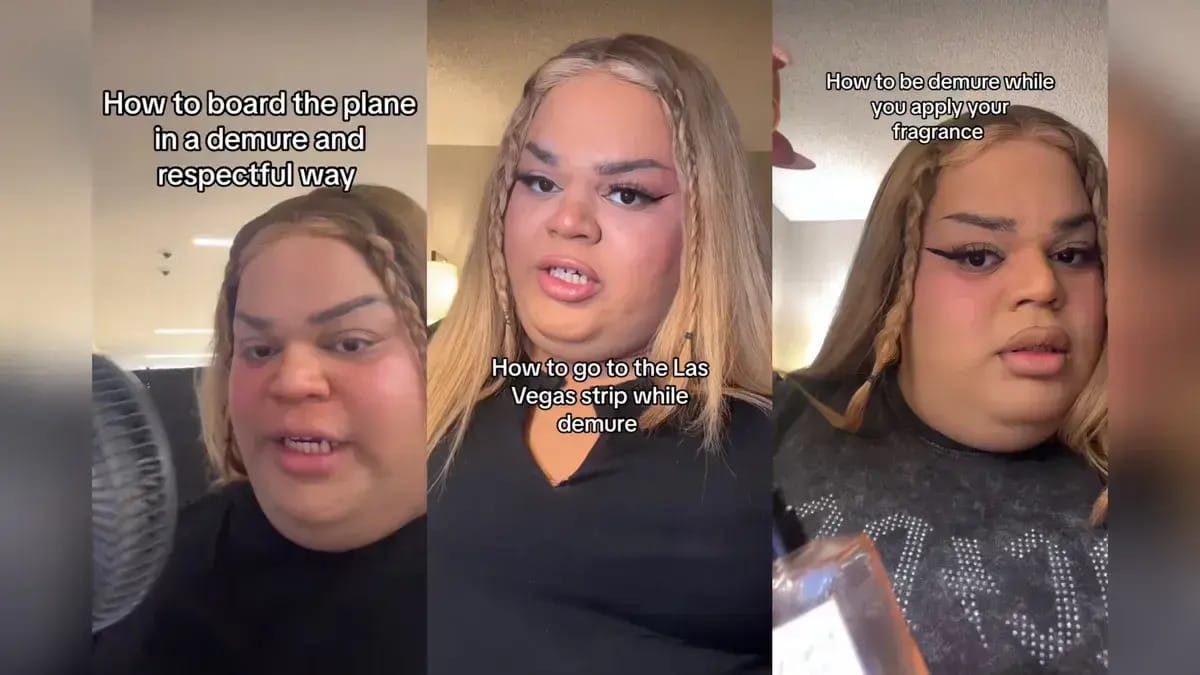
Jools Lebron
Polarisation (Merriam-Webster)
The grim counterweight to all of this queer joy. While dictionaries were canonising silly terms like yassify and -ussy, they were also reflecting backlash: growing division, rising hostility, culture wars. An odd time to be alive - queer slang thriving online while the political climate hardened around us. A time when visibility feels both vital and dangerous.
2025
Lewk (Cambridge)
What it means: A striking, memorable outfit or style moment - not just clothes, but a whole curated vibe.
Let’s use it in a sentence: Brandy knew she had to serve a lewk at the film premiere if Mandy was ever going to notice her.
Why it was chosen: Honestly, I have no idea. Lewk feels like one of those words that peaked years ago on drag stages and Instagram captions. But its dictionary inclusion says something about our ongoing fascination with queer frivolity, and its complicated place in mainstream culture.
It also feels like a bittersweet note to end this list on. A moment that reminds us of the joy in queer culture at a time when it can feel hard to find and hold on to.
So what do all of these words actually tell us?
That the same culture delighting in lewk and demure and yassify and -ussy is simultaneously legislating away trans healthcare and debating whether we ‘deserve’ equal marriage.
It's a grim paradox: we've never been more visible in language, and perhaps never more targeted in politics. Every new queer word in the mainstream brings both recognition and resistance. Celebrated and criminalised in the same breath. Adored and despised by the same people.
It’s a mess.
Or, to borrow from Oxford's long-forgotten Word of the Year from 2012 - it's an absolute 'omnishambles’.
But all this trawling and searching and head-scratching has me thinking... why are we letting mainstream publications decide what words are important? Maybe it's time we had our own Queer Word ‘Word of the Year’?
One chosen by us, for us.
What do you think — should we crown one together?
Should Queer Word have its very own 'Word of the Year'? (and if you have a specific word in mind make sure to share it in the comments!) |